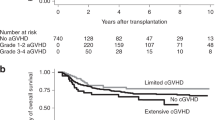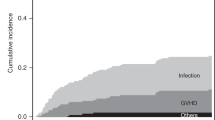Abstract
In order to assess the incidence and analyze reasons which cause prolongation of hospital stay in patients engrafted after peripheral blood stem cell transplantation (PBSCT), we performed this retrospective analysis. One hundred patients (receiving 123 conditioning regimens) were included in the analysis. Criteria for discharge were presence of myeloid engraftment and absence of severe concomitant problems. Ninety subjects (73%) were discharged just after engraftment was reached on day +12 (10–14). Discharge was delayed in 33 patients (27%) and the mean prolongation was 3 days (1–11). In 31 patients (25%) delayed discharge was due to complications: in 14 patients (11.4%) because of GIT problems, in 16 patients (13%) because of infectious complications and in one patient because of cardiotoxicity. A significantly higher number of infectious complications was found in patients conditioned with BEAM (19.7% vs 4.2%, P < 0.05) while GIT toxicity was the most common reason for discharge delays in patients conditioned with melfalan 200 mg/m2 (8.2% vs 14.7%, NS). No risk factors of hospital stay prolongation were determined. We conclude that in spite of rapid engraftment, non-hematological toxicities and infections remain important limitations for further reduction of the length of patient hospitalization in a significant number of patients after PBSCT. Bone Marrow Transplantation (2000) 26, 877–880.
This is a preview of subscription content, access via your institution
Access options
Subscribe to this journal
Receive 12 print issues and online access
$259.00 per year
only $21.58 per issue
Buy this article
- Purchase on Springer Link
- Instant access to full article PDF
Prices may be subject to local taxes which are calculated during checkout
Similar content being viewed by others
References
Kessinger A, Armitage JO, Landmark JD et al. Autologous peripheral hematopoietic stem cell transplantation restores hematopoietic functions following marrow ablative therapy Blood 1988 71: 723–729
McQuaker IG, Hunter AE, Pacey S et al. Low-dose filgrastim significantly enhances neutrophil recovery following autologous peripheral-blood stem-cell transplantation in patients with lymphoproliferative disorders: evidence for clinical and economic benefit J Clin Oncol 1997 15: 451–457
Nemunaitis J, Rabinowe SN, Singer JW et al. Recombinant granulocyte–macrophage colony-stimulating factor after autologous marrow transplantation for lymphoid cancer New Engl J Med 1991 324: 1773–1778
Cetkovský P, Koza V, Jindra P et al. Individual criteria could be optimal for starting G-CSF application after autologous stem cell transplantation Bone Marrow Transplant 1997 20: 639–641
Bolwell BJ, Pohlman B, Andresen S et al. Delayed G-CSF after autologous progenitor cell transplantation: a prospective randomized trial Bone Marrow Transplant 1998 21: 369–373
Buijt I, Ossenkopele GJ, Uyl-de-Groot CA, Huijgens PC . Costs of intensive treatment and follow-up of patients with multiple myeloma Anti-Cancer Drugs 1998 9: 889–897
Le Corroller AG, Moatti JP . The economic evaluation of hematopoietic growth factors in high dose chemotherapy Anti-Cancer Drugs 1998 9: 917–925
Uyl-de Groot CA, Hijgens PC, Rutten FFH . Colony-stimulating factors and peripheral blood progenitor cell transplantation: benefits and costs PharmacoEconomics 1996 10: 23–35
Klumpp TR, Mangan KF, Goldberg SL et al. Granulocyte colony-stimulating factor accelerates neutrophil engraftment following peripheral-blood stem-cell transplantation: a prospective, randomized trial J Clin Oncol 1995 13: 1323–1329
Westermann AM, Holtkamp MJ, Linthorst GAM et al. At-home management of aplastic phase following high-dose chemotherapy with stem-cell rescue for hematological and non-hematological malignancies Ann Oncol 1999 10: 511–517
Hartmann O, Le Corroller AG, Blaise D et al. Peripheral blood stem cell and bone marrow transplantation for solid tumors and lymphomas: hematologic recovery and costs. A randomized, controlled trial Ann Intern Med 1997 126: 600–607
Bensinger WI, Appelbaum FR, Rowley S et al. Factors that influence collection and engraftment of autologous peripheral-blood stem cells J Clin Oncol 1995 13: 2547–2555
Peniket AJ, Perry AR, Linch DC, Goldstone AH . Delays in discharge from hospital after haematological recovery from peripheral blood stem cell transplantation: is recovery from gut toxicity an important factor? Bone Marrow Transplant 1997 19: (Suppl. 1) S 126 (Abstr. P 501)
Cetkovský P, Jindra P, Škopek P et al. Rapid engraftment does not shorten the duration of hospital stay in some patients after peripheral blood stem cell transplantations (PBSCT) Bone Marrow Transplant 1999 23: (Suppl. 1) S165 (Abstr. 544)
Jindra P, Koza V, Cetkovský P et al. Cyclophosphamide 3 g/m2 and G-CSF is an effective and safe outpatient-based PBSC mobilizing regimen: a single centre experience (letter) Bone Marrow Transplant 1997 20: 91–93
Guba SC, Vesole DH, Jagannath S et al. Peripheral stem cell mobilization and engraftment in patients over age 60 Bone Marrow Transplant 1997 20: 1–3
Haas R, Möhle R, Frühauf S et al. Patients characteristics associated with successful mobilization and autografting of peripheral blood progenitor cells in malignant lymphoma Blood 1994 83: 3787–3794
Olivieri A, Corvatta L, Montanari M et al. Paroxysmal atrial fibrillation after high-dose melphalan in five patients autotransplanted with blood progenitor cells Bone Marrow Transplant 1998 21: 1049–1053
Author information
Authors and Affiliations
Rights and permissions
About this article
Cite this article
Cetkovský, P., Škopek, P. & Schützová, M. Causative factors for prolonged hospitalization beyond the point of engraftment in patients after autologous peripheral blood stem cell transplantation. Bone Marrow Transplant 26, 877–880 (2000). https://doi.org/10.1038/sj.bmt.1702632
Received:
Accepted:
Published:
Issue Date:
DOI: https://doi.org/10.1038/sj.bmt.1702632
Keywords
This article is cited by
-
The symptom experience in the first 100 days following allogeneic hematopoietic stem cell transplantation (HSCT)
Supportive Care in Cancer (2008)
-
Home care for children following haematopoietic stem cell transplantation
Bone Marrow Transplantation (2003)



